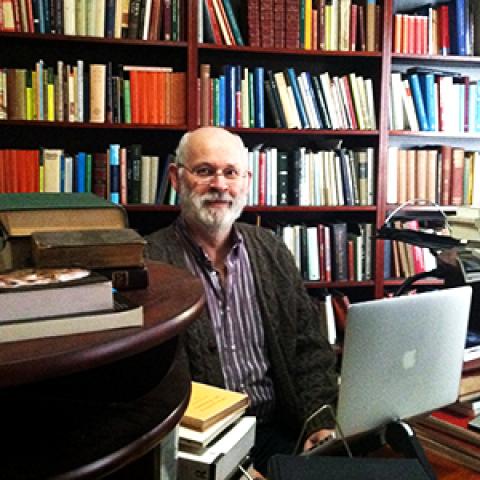Ayelet Haimson Lushkov and jfarrell
January 25, 2018
A Day in the Life of a Classicist is a monthly column on the SCS blog written by Prof. Ayelet Haimson Lushkov celebrating the working lives of classicists. If you’d like to share your day, let us know here.
Joe Farrell is the president of the SCS, and Professor of Classical Studies at Penn.
My schedule changes a lot from day to day, term to term, and year to year. If I had to say what ties most of my work together, it would be writing. I don’t mean just things I want to publish. Writing is central to all facets of my work. I’m constantly writing course proposals, syllabi, comments on student papers, article submissions, promotion dossiers, memos, agenda for meetings, and so on. So, In general, when I’m not in class or in a meeting, I try to write. In the two hours or so after I wake up (i.e. from about 7–9 am), along with the typical ablutions, caffeination, and so on, I get started on my writing. Simple things come first: correspondence, calendar, tasks and deadlines, and so forth. Then I go to my home office, and if there is nothing to take me away from it, I will basically stay there writing till about 4 pm. Then I listen to the news while perhaps making dinner preparations or doing some other household chores, interspersing these with more simple writing tasks like those with which I started out in the morning. The evening is less predictable. If family members are around, we might all relax together with some activity, and if not, I’m personally likely to tackle some slightly heavier writing assignment, though probably not something I’m planning to publish, unless it’s at the stage of needing only stylistic revision. It’s also time that I might spend reading, whether in order to write something or just to keep up with what other people are doing.
I try to prepare my classes for the week over the previous weekend, but on a teaching day I like to concentrate on whatever the day’s lesson may be until the end of class. That means that on teaching days, I tend not to do morning writing, but I try to do some in the afternoon. If I’m teaching a graduate seminar, though, since these usually meet from 2:00– 5:00 pm, I probably won’t think about anything else all day, and I’ll probably spend the evening either processing what happened in seminar or else just relaxing by doing something entirely different. But if my teaching is over by mid-afternoon, and I don’t have office hours, and there’s no department colloquium or anything like that, I will try to do some writing then, although that is also time might be spent reading instead.
Music used to be essential to my morning routine. In order to ease the transition from the whole waking-up-and-getting-to-work to sitting-down-at-my-desk-and-really-getting-into-it, on my way to my office I would stop at the CD player and play a certain disc. The title cut is a setting of the Roman Catholic Mass by Thomas Tallis, performed by a group called The Clerkes of Oxenford. I’m not quite sure how I settled on this piece as indispensable to my morning routine, but I’m pretty sure it happened when I was working on my second monograph, which ends with a reading of another piece by Tallis, a Pentecost motet called Loquebantur variis linguis. I listened to a lot of that sort of music in those days, and I would continue to listen to a lot of the same pieces from day to day, and I found that immensely helpful. The music seemed to serve the purpose of reminding me where I was in my own project and got me in to the work more quickly than I think would have happened otherwise.

Heavy teaching, grading, meeting days, and so on, I don’t usually find difficult to manage. You just have to do it, and the sooner, the better. You might be off your routine for a day or two, but then you try to get back to it. For me, the longer you’re off the routine, the harder it is to get back on it, which means that spreading the grading (or whatever) out by doing a little each day is more disruptive than doing it all at once.
“Days with family demands,” now that both of our children are adults, doesn’t mean the same thing that it once did. Practically everything that I’ve said here would not have applied twenty years ago. Our daughter was born in October, and I was teaching as usual. There was no such thing as paternity leave in those days, but academic schedules offer flexibility; so, once our daughter arrived, both of our lives revolved around her, except that I would walk up to campus, teach whatever class needed teaching that day, walk home, and organize my time there around whatever my wife or daughter needed. Anyone who has had children will understand that we were all delirious from lack of sleep, but what I can’t remember was whether my delirium helped with my sense of not really getting any work done, or made it worse. What I do remember is that I managed to write a paper that semester, after a fashion. I would actually compose it in my head when I was walking back and forth to and from campus, and I did so literally by reciting the paper, verbatim, in my mind as a walked, I would always start at the beginning, as I usually do when I write, and by going quickly through the part I had composed so far, I could add a little bit with each trip.
That was literally all the “writing” I was able to do that term, because I had no other time for it. But when the semester was over, and I finally found a day to sit down at the keyboard, it just came pouring out. It was like taking dictation. And it was a long paper. As I usually do with anything I write, I had to cut it, but after a round of revisions, it got published in a good journal. It’s actually one of my favorite papers. But I’ve never worked that way again, either before or since.
I think most non-academics think that we have a pretty relaxed schedule, and for myself, I’m happy to admit that the amount of times that I have to be in some specific place at some specific time, are few. But getting the work done within the time available is always a challenge.
(Photo: "Joe Farrell," Ann de Forest, unpublished)
Authors


